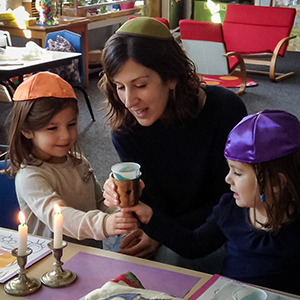
When I was a kid, I did my homework at the kitchen table, or sprawled out on my bedroom floor. The location varied but the terms were the same: I was on my own. Sure, my folks were there to check in, but mostly, I tackled book reports, current events assignments, and math quizzes, solo. (Spoiler alert: I turned out OK.)
And yet, such a laissez-faire attitude toward homework, as well as most other activities, is a thing of the past. Today’s parents spend far more time with their children than parents did a generation ago—and it’s not always helping our kids.
As we know from the myriad articles published over the past year about the ills of over-parenting, this kind of childcare fails to give our kids room—to take risks, to try new things, to develop skills of resilience that are so crucial in the project of becoming a strong and confident adult.
“Kids are anxious, afraid and risk-averse because parents are more focused on keeping their children safe, content and happy in the moment than on parenting for competence,” says Jessica Lahey, author of The Gift of Failure. In her book, Lahey advocates for an end to the hovering parent.
In other words, kids need to learn to fail, and fail again, and learn from their own mistakes.
And yet… Jewish parents, like most parents, love their children fiercely and want to make things perfect for our kids. We want them to be happy and successful. We want to teach them how. We have a primordial urge to… hover.
And who can blame us? Judaism tells us to! According to traditional Jewish law, we are bound to our children by a series of commandments and responsibilities. The Talmud, a compilation of rabbinic teachings that informs much of today’s Judaism, mandates that a father teach his child Torah, find him a wife, and teach him a trade. Later, scholars added, “teach him to swim” as another requirement, thus offering us our earliest version of a parenting manual. (While swim instruction might seem an odd choice to include in the basics of how to raise your kid right, many rabbis interpret this less literally, and rather, see it as a mandate to help our kids stay afloat on the choppy waters of life).
Thousands of years later, it’s not hard to see that the rabbis were likely encouraging what Lahey and so many other experts have pleaded: set your child up with the necessary life skills so that he or she may leave the nest with a solid sense of self. But don’t smooth out all the bumps in the road. Let them trip and fall.
It’s difficult to watch your child hurt; no one wants that. But if we think about it, those failures are opportunities. For after all, haven’t we, too, failed and recovered? Don’t we each have an anthology of personal stories that detail our embarrassments and flops, and small victories, too?
Instead of looking at parenting as a chance to make everything perfect for our kids, maybe we should look at this holy task of raising children as a chance to share, warts and all, the details of our struggles and our redemption. And then perhaps, if we make a habit of sharing the narratives of our missteps, and the bumpy details of how we recovered, we might just make it OK for our kids to fail, too.
About the author: Adina Kay-Gross is Kveller's special projects editor and one of Kveller’s contributing editors. She is also the Editorial Director at The Covenant Foundation and a Writing Consultant at Hebrew Union College-Jewish Institute for Religion. Adina earned an MFA in nonfiction writing from Columbia University and has been published in a number of literary magazines as well as in Slate, Tablet, The Jewish Week and The Forward. She lives in the suburbs of New York with her husband Jonathan, her twin girls, and her dog, Pretzel.

January 1, 2016